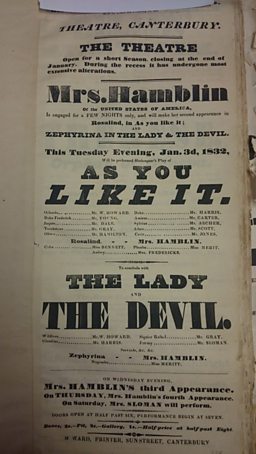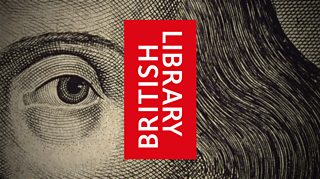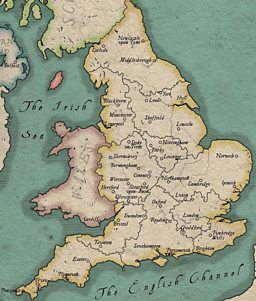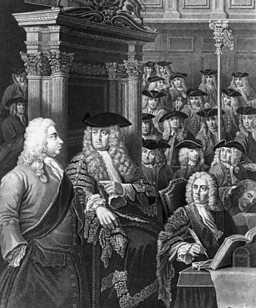Mrs Hamblin - A woman scorned
On the 3rd January 1832, the Canterbury Theatre staged a production of Shakespeare’s As You Like It starring celebrity actress Mrs Elizabeth Hamblin – ‘of the United States of America’ - as Rosalind.
It was a thrill for the Canterbury audience to witness Mrs Hamblin's performance as she had recently returned from a successful stint in New York's renowned Bowery Theatre. However, in celebrity style, this famous American actress of the day was struggling with a tumultuous private life which was about to boil over back in the States…
-
![]()
Much ado near me
Hear more Shakespeare stories on BBC Radio Kent
-
![]()
Shakespeare Festival 2016
The BBC celebrates the genius of the bard

Elizabeth was the daughter of a respected Shakespearian actor named William Blanchard and half-sister to the actor and playwright E. L. Blanchard. In time she followed her father and brother to the stage, finding success at London's Covent Garden and Haymarket theatres. She married a fellow actor, Thomas S. Hamblin, in 1824, and the following year they emigrated to the United States in search of fame and fortune.
Thomas, who had been under-appreciated by the London critics, found the admiration he had been searching for in the American audiences and became manager of the Bowery Theatre in 1831 to great acclaim.
So successful was he that in autumn of that year Elizabeth left for England to undertake a tour of the provinces and to seek out new talent for her husband's thriving theatre. While she was performing in Canterbury, Thomas was working very closely with two beautiful young actresses, Josephine Clifton and Naomi Vincent, casting them in leading roles and, according to rumour, seducing them both.
News of his philandering may well have spread through the close-knit theatrical circles, and upon her return to New York in June 1832, Elizabeth Hamblin demanded a legal separation.
In 1834, after Naomi Vincent moved into Thomas' house and gave birth to his child, Elizabeth was finally granted a divorce that gave her sole custody of her two children. The terms of the divorce also forbade Thomas from re-marrying while she was alive - so that she could maintain her career as the one and only, Mrs Hamblin.
The licensing Act 1737
By Hannah Manktelow, University of Nottingham doctoral student, working with the British Library
At the time Mrs Hamblin was playing the part of Rosalind in As You Like It at Canterbury Theatre in 1832, theatre in general had been highly regulated for nearly a century.

It was back in 1737 that the then Prime Minister Robert Walpole introduced the Licensing Act. It was a bid to gain control of the playhouses after Walpole’s government was the subject of numerous satires on the London stage.
The Act introduced strict controls and censorship on theatres. It stated that: all new plays must be submitted to the Lord Chamberlain for examination and were subject to his censorship; that only theatres that held a patent could stage theatrical entertainments; and that no new patents could be issued.
As only London’s Covent Garden and Drury Lane held patents, they were effectively the only places in the whole country that could legally stage Shakespeare.
At this time most towns did not have permanent theatres, they were served by groups of travelling players that would set up in barns or town halls for as long as necessary, before moving on.
Under the Act they were now operating illegally, but local magistrates were often willing to turn a blind eye and allow them to continue playing. Some did so from a love of the arts, some because they enjoyed the financial remuneration from grateful players, and some because they were simply unhappy with Westminster’s attempt to dilute their powers (previously, local magistrates could license players as they saw fit).
Also you can see from the British Library’s stock of playbills that in order to get around the license laws, the Shakespeare play was often billed as being in the middle of a concert or musical performance. This gave the impression that what was on offer was not a play – surely not! – but a mix of entertainment. In reality of course, the audience would be attending to see the play and not to hear the music. But by charging for the concert the theatre manager avoided prosecution.
About Shakespeare on Tour
From the moment they were written through to the present day, Shakespeare’s plays have continued to enthral and inspire audiences. They’ve been performed in venues big and small – including inns, private houses and emerging provincial theatres.

BBC English Regions is building a digital picture which tracks some of the many iconic moments across the country as we follow the ‘explosion’ in the performance of The Bard’s plays, from his own lifetime to recent times.
Drawing on fascinating new research from Records of Early English Drama (REED), plus the British Library's extensive collection of playbills, as well as expertise from De Montfort University and the Arts and Humanities Research Council, Shakespeare on Tour is a unique timeline of iconic moments of those performances, starting with his own troupe of actors, to highlights from more recent times. Listen out for stories on Shakespeare’s legacy on your BBC Local Radio station from Monday 21 March, 2016.
You never know - you might find evidence of Shakespeare’s footsteps close to home…
Craig Henderson, BBC English Regions

-
![]()
Shakespeare Lives
The nation’s greatest performing arts institutions mark 400 years since the Bard's death
Related Links
Sir Robert Walpole

Shakespeare on Tour: Around Kent
-
![]()
Touring Kent to avoid the plague in London
Shakespeare's Lord Strange’s Men perform in Kent
-
![]()
‘Wherefore to Dover?’
Dover, Faversham and the 1597 tour
-
![]()
A rare example of a surviving Shakespearean venue
Likely to have staged a Shakespeare play during the dramatist’s own lifetime
-
![]()
Small towns big on Shakespeare
How Shakespeare's company visited the smallest towns
-
![]()
Sir Edward Dering – Proud owner of Shakespeare’s First Folio
And possibly the host of the first amateur performance of Shakespeare
-
![]()
Dover Theatre and Miss Davenport
'The juvenile actress of the day'
Shakespeare on Tour: Around the country
-
![]()
The 18th century impersonator who was 'the Jon Culshaw of his day'
The city gets its prestigious Theatre Royal
-
![]()
The Northampton Repertory Theatre
Pieces of history in Northampton
-
![]()
Drunken robbers threaten the leader of Shakespeare's players
As he collects admission money at the door!
-
![]()
Shakespeare's tragic heroes appear in Launceston
Size not everything as Shakespeare's tragic heroes appear in remote town of Launceston













